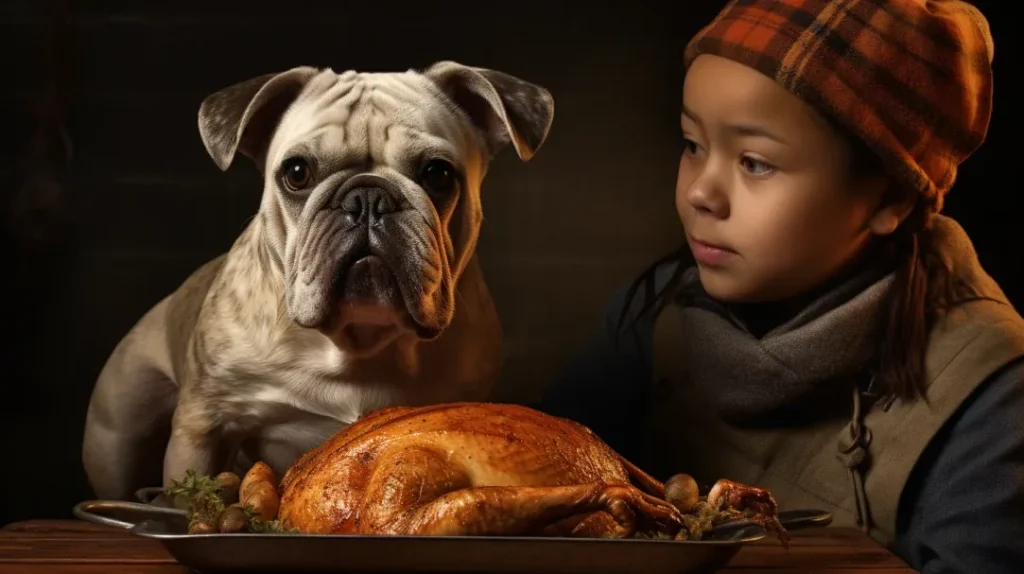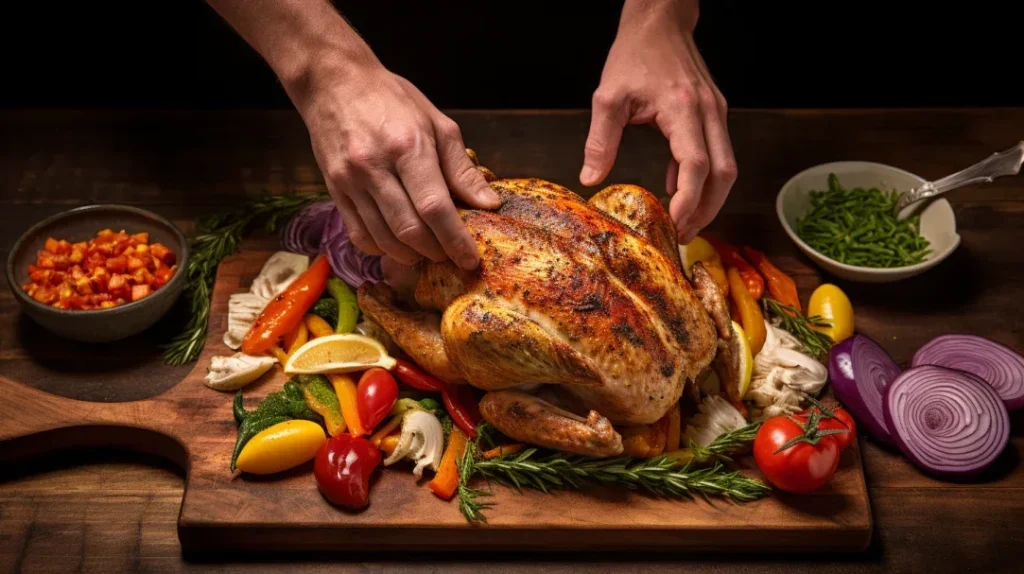Can dogs eat rotisserie chicken? Well, you’re in for a treat! Dogs can indeed enjoy rotisserie chicken, but there are a few things you need to know.
This article will detail the nutritional value, potential benefits, risks, and considerations of feeding your canine friend this mouthwatering treat.
So, get ready to discover how to safely serve rotisserie chicken to your dog and keep them wagging their tail with delight!
Key Takeaways
- Dogs can safely eat rotisserie chicken meat if it is boneless, skinless, and unseasoned. The meat itself is a good source of protein, which is essential for your dog’s overall health. However, a few things to consider before sharing this treat with your canine companion.
- Rotisserie chicken is a nutritious source of protein for dogs, containing essential amino acids and vitamins.
- Feeding dogs raw or undercooked chicken, including chicken, can lead to digestive issues and bacterial infections.
- Dogs should not be given rotisserie bones as they can splinter and cause internal injuries or choking hazards.
- When preparing and serving rotisserie chicken for dogs, it is important to remove the skin, cook it thoroughly, avoid seasoning with harmful spices, and be aware of portion sizes and potential allergies.
What is Rotisserie Chicken?
Rotisserie chicken is a popular cooked chicken dish often sold in grocery stores or restaurants. It is prepared by slowly cooking a whole chicken on a rotating spit, which creates juicy and flavorful meat. The cooking method ensures that the chicken remains tender and moist, making it a delicious choice for humans and sometimes dogs. However, when feeding rotisserie chicken to your canine friend, removing the skin and bones is essential to avoid any potential risks.
Rotisserie chicken’s lean meat provides protein for dogs, but the skin is heavy in fat and can cause weight gain and other health issues. By removing the skin and bones and serving only the lean meat, rotisserie can be a tasty and occasional treat for your furry friend.
Can Dogs Eat Rotisserie Chicken?
Rotisserie chicken can be a tasty treat for humans, but can dogs enjoy it too? Many dog owners wonder if their furry friend can enjoy this delicious dish. The answer is both yes and no.
Dogs can safely eat rotisserie meat if it is boneless, skinless, and unseasoned. The meat itself is a good source of protein, which is essential for your dog’s overall health. However, a few things to consider before sharing this treat with your canine companion.
Firstly, chicken bones can be hazardous for dogs. Cooked bones, tiny ones, can splinter and cause choking or internal injuries. So, removing all bones from the rotisserie chicken is crucial before offering it to your dog. Additionally, the skin of rotisserie meat tends to be high in fat content, which can be problematic for dogs, especially those with weight issues or sensitive stomachs. Therefore, removing the skin before giving your dog a piece of this meat is best.
While rotisserie chicken can be a flavorful addition to your dog’s diet, it is essential to remember that it should not replace their regular food. Dogs require a balanced diet that includes a variety of nutrients from different food sources. Rotisserie meat chicken should only be given as an occasional treat or a supplement to their regular meal.
Feeding your dog too much rotisserie meat can lead to digestive issues such as diarrhea or an upset stomach. If you decide to give your furry friend a taste, it’s best to offer a small amount and observe their reaction. If they show any signs of discomfort or digestive upset, it’s best to avoid giving them anymore.
If you want to incorporate chicken into your dog’s diet more regularly, there are safer options. You can cook chicken at home without any seasoning or spices, ensuring it is adequately cooked and removing all bones and skin. Another option is to choose store-bought rotisserie chicken specifically made for dogs, as it is cooked without added seasonings or harmful ingredients.
In conclusion, rotisserie meat can be safe for dogs to eat, but there are potential risks. Always remove the bones and skin and feed it in moderation. Keeping your dog healthy and happy requires a balanced and comprehensive diet with lean proteins like chicken and other critical elements.
The Nutritional Value of Rotisserie Chicken for Dogs
Rotisserie chicken can provide several nutritional benefits for dogs. It is an excellent protein source, essential for muscle development and overall health. Protein from chicken helps support a robust immune system and can aid in tissue repair.
However, it’s important to note that rotisserie meat should only be given in moderation and with a few precautions. Remove the bones before feeding them to your dog, as they can pose a choking hazard and may cause internal injuries. The skin of rotisserie chicken is high in fat content, so it’s best to remove it to avoid weight gain or digestive issues.
When feeding your dog chicken, ensure it is unseasoned and cooked thoroughly. Avoid any added spices or harmful ingredients. It’s also important to remember that chicken should be a supplement to your dog’s regular and balanced diet, not a replacement.
Talk to your vet about how much rotisserie chicken to feed your dog and any health issues. Providing your furry friend with a tasty and nutritious treat like rotisserie can be a way to show them love and give a variety to their meals.
Potential Benefits of Feeding Rotisserie Chicken to Your Canine Friend

Feeding rotisserie chicken to your dog can provide potential benefits, such as increased protein intake and essential nutrients, when prepared and served correctly. However, it’s important to be aware of the potential risks and practice proper cooking techniques to ensure your canine friend’s health and safety.
Here are some key points to consider:
Benefits of Rotisserie Chicken for Dogs:
- Increased protein intake: Rotisserie meat is an excellent source of lean protein, essential for your dog’s muscle development and overall health.
- Essential nutrients: Chicken contains important vitamins and minerals like B vitamins, iron, and zinc, contributing to your dog’s overall well-being.
Potential Risks and Proper Cooking Techniques:
- Bones: Before feeding your dog chicken, remove all bones to avoid choking or digestive disorders.
- Seasonings and marinades: Avoid providing your dog’s chicken with added seasonings or marinades, as they may contain harmful ingredients.
Risks and Considerations of Feeding Dogs Rotisserie Chicken
While sharing your rotisserie chicken with your furry friend may be tempting, it’s essential to consider the potential risks and take necessary precautions for their health and safety.
Feeding dogs raw chicken, including rotisserie meat, can pose several risks and lead to potential digestive issues. Raw chicken may carry Salmonella or Campylobacter, which can give dogs food sickness. These bacteria can cause diarrhea, vomiting, and dehydration.
Raw chicken bones can shatter, choke, or injure your dog’s digestive tract. It’s crucial to cook chicken thoroughly to kill harmful bacteria and remove all bones before feeding it to your dog.
If you share rotisserie chicken with your pet, make sure it’s plain, without any seasonings, and remove the skin as it’s high in fat and may cause gastrointestinal upset.
Can Dogs Eat Rotisserie Chicken Bones

It’s important to note that dogs shouldn’t eat rotisserie chicken bones as they can splinter and potentially harm your furry friend. While dogs can digest certain types of bones, such as raw bones, cooked bones, especially those from rotisserie meat, pose potential health risks.
Here’s what you need to know:
- Splintering: Cooked chicken bones can easily splinter into sharp fragments, which can cause internal injuries, such as punctures or tears, in your dog’s digestive tract.
- Choking Hazard: Small bones, like those found in rotisserie chicken, can get stuck in your dog’s throat, leading to choking or asphyxiation.
It’s crucial to prioritize your dog’s safety and avoid giving them rotisserie meat bones. Instead, opt for boneless chicken as a safer alternative to ensure your canine companion’s health and well-being.
How to Safely Prepare and Serve Rotisserie Chicken for Your Dog

To safely prepare and serve rotisserie chicken for your dog, follow these guidelines:
- Skin and fat are hard for dogs to digest, so remove them.
- Chicken should be cooked to 165°F (74°C) to kill dangerous microorganisms.
- Avoid seasoning the chicken with salt or other spices, as they can harm your dog’s health.
Safe Cooking Temperatures
Make sure you cook the rotisserie chicken to the proper safe cooking temperature to ensure it’s safe for your dog to eat. Dogs can enjoy rotisserie white meat as a tasty treat, but taking certain precautions to protect their health is essential. Here are some key points to keep in mind:
Safe cooking methods:
- Always cook the chicken thoroughly to kill any bacteria or parasites that may be present.
- Avoid using seasoning or marinades that contain ingredients harmful to dogs, such as onion or garlic.
Potential health risks:
- Undercooked chicken may contain salmonella or campylobacter, which can upset dogs’ stomachs.
- Bones from rotisserie chicken can splinter and pose a choking hazard or cause internal injuries.
Avoid Seasoning With Salt
You should avoid seasoning your rotisserie white meat with salt, which can harm your dog’s health. While rotisserie chicken can be a tasty treat for your furry friend, it’s essential to be mindful of the ingredients used to season it. Salt, in particular, can lead to sodium poisoning in dogs, causing symptoms such as increased thirst, vomiting, and diarrhea. Instead, consider using dog-friendly seasoning options to add flavor to your chicken.
Some safe alternatives include herbs like parsley, rosemary, and oregano, which enhance the taste and offer potential health benefits for your pup. For example, parsley is known for its breath-freshening properties, while rosemary and oregano have antioxidant and anti-inflammatory properties. Remember, moderation is key when sharing rotisserie white meat with your dog.
| Dog-Friendly Seasoning Options | Potential Health Benefits |
|---|---|
| Parsley | Breath-freshening |
| Rosemary | Antioxidant, anti-inflammatory |
| Oregano | Antioxidant, anti-inflammatory |
Portion Control: How Much Rotisserie Chicken Can Dogs Have

Remember, moderation is essential when feeding your furry companion rotisserie chicken. While dogs can enjoy this tasty treat, exercising caution and controlling the portions is essential.
Here are some essential factors to consider for portion control:
- Portion Control for Small Dogs: Small dogs have different nutritional needs and can easily be overfed. Keep their portion size smaller to avoid weight gain and potential health issues. Talk to your vet about how much rotisserie white meat your dog needs based on size, breed, and activity level.
- Potential Health Risks for Dogs with Pancreatitis: Dogs with pancreatitis should avoid fatty foods, including rotisserie chicken. Excess fat can trigger inflammation and worsen the condition.
Considering portion control and potential health risks, exploring alternatives to rotisserie chicken for a balanced canine diet is essential.
Alternatives to Rotisserie Chicken for a Balanced Canine Diet
Consider adding lean cuts of turkey or fish as alternatives to rotisserie chicken for a balanced canine diet. Rotisserie chicken is great, but your pet needs diversity to get all the nutrients.
Lean turkey and fish are high in protein, vitamins, and minerals. Turkey is lean and easy to cook and shred for your dog. Salmon and sardines include omega-3 fatty acids, which enhance coat and skin health.
These homemade dog food options can be a nutritious and delicious alternative to rotisserie meat.
Now, let’s delve into the signs of chicken allergies in dogs: what to look out for.
Signs of Chicken Allergies in Dogs: What to Look Out For
Suppose your dog has been experiencing digestive issues like vomiting or diarrhea. In that case, it may be a sign of chicken allergies in dogs, so it’s essential to be aware of these symptoms and consult your veterinarian for guidance.
Allergic reactions to chicken in dogs can manifest in various ways, including:
- Skin problems: Look out for itching, redness, hives, or hot spots on your dog’s skin.
- Gastrointestinal issues can range from mild upset stomach and diarrhea to more severe symptoms like vomiting and abdominal pain.
When it comes to chicken allergy symptoms, paying attention to your dog’s behavior and any changes in their health is crucial. Your veterinarian can test for chicken allergies and recommend therapy.
Frequently Asked Questions
Can dogs eat Costco rotisserie chicken?
Yes, dogs can eat Costco rotisserie white meat if it’s plain, cooked, and free of seasoning, sauces, skin, and bones. Ensuring the chicken is simple and contains no potentially harmful additives is essential.
Can dogs eat rotisserie chicken bones?
No, dogs should not eat rotisserie chicken bones or any cooked bones. Splintering cooked bones can choke your dog or damage his digestive tract. Always remove bones before offering chicken to your dog.
Can dogs eat lemon pepper rotisserie chicken?
It’s best to avoid giving dogs rotisserie chicken with lemon pepper seasoning or any other spices. Stick to plain, cooked chicken without herbs or additives to ensure your dog’s safety.
Can dogs eat rotisserie chicken every day?
Feeding your dog rotisserie chicken every day is not recommended. While plain, cooked chicken can be a part of a balanced diet for dogs, it should be given in moderation alongside their regular dog food to ensure they receive all necessary nutrients.
Can dogs eat rotisserie chicken skin?
It’s best to avoid giving dogs rotisserie skin as it is high in fat and can lead to digestive upset or pancreatitis. Stick to plain, cooked chicken meat for your dog.
What to do if your dog eats a rotisserie chicken?
If your dog eats a rotisserie chicken, especially bones, monitor them closely for signs of choking, discomfort, or digestive issues. Contact your veterinarian for guidance on potential treatments or further actions to ensure your dog’s safety.
Can dogs eat rotisserie chicken, according to Reddit?
Reddit discussions can provide helpful information, but it’s essential to verify the advice from reliable sources such as veterinarians or pet experts when determining what dogs can eat. Always prioritize your dog’s safety and health.
Conclusion
Finally, rotisserie chicken can be a delightful and nutritious addition to your dog’s diet, but it’s essential to recognize the hazards and precautions.
Feeding your canine friends small, boneless portions of well-cooked chicken can give them essential nutrients. However, avoiding feeding them bones is crucial, as they can pose a choking hazard or cause internal injuries.
Always consult your veterinarian to ensure your dog’s diet is balanced and meets their specific nutritional needs.
Quick Paw Note: While we’re passionate about providing helpful pet nutrition content, it’s essential to remember that this info isn’t a substitute for professional veterinary advice. Always consult your vet for your pup’s specific dietary needs. We strive for accuracy, but paw-lease note that we can’t guarantee the complete reliability of all content. Stay pawsome! 🐾




